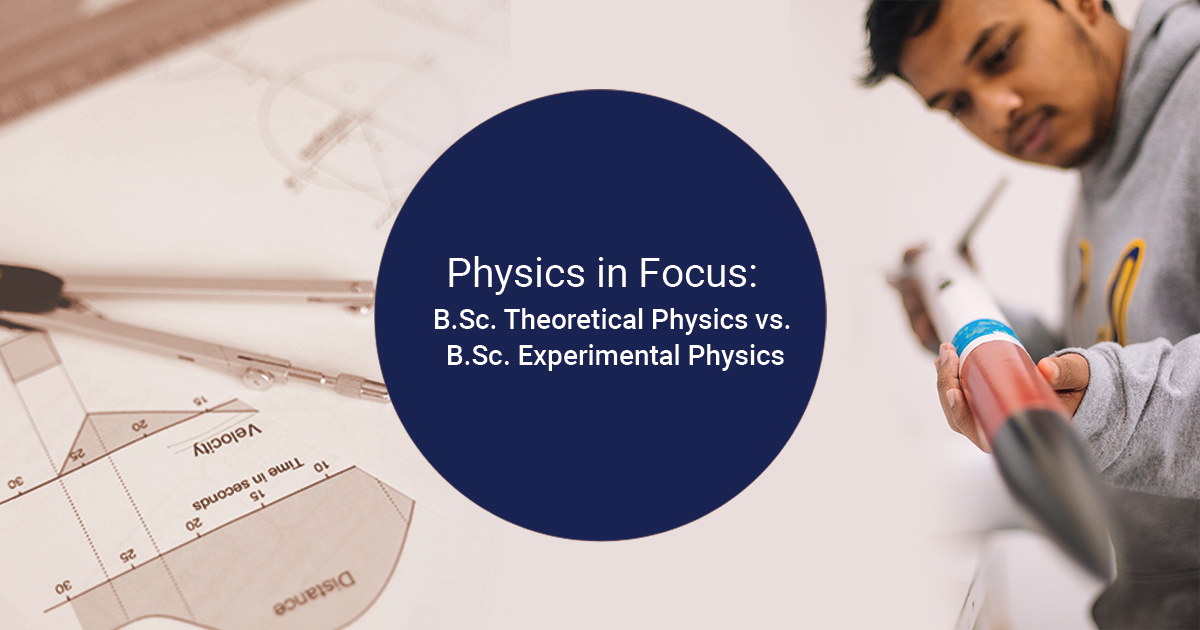Blog Detail


Physics in Focus: B.Sc. Theoretical Physics vs. B.Sc. Experimental Physics
06-12-2024

Do you like to think, calculate, and solve problems on the board? Or, do you like to take a hypothesis, design an experiment and test the hypothesis? This is the basic difference between theoretical and experimental Physics. Physics explains how the universe works and it has a wide application across various industries. B. Sc. in Physics is the first step towards pursuing a wide range of careers where concepts of Physics are essential skills. B. Sc. Theoretical Physics and B. Sc. Experimental Physics are two super-specialised fields that students can choose as per their inclination towards theory or the practical aspect of the subject.
Course Eligibility and Duration: B.Sc. Theoretical Physics vs. B.Sc. Experimental Physics
To qualify for the B.Sc. programme, one must complete 12th grade with Physics, Chemistry and Maths as compulsory subjects. they must score a minimum of 50% in the 12th board exams. Some colleges have an entrance exam whose scores will also be considered along with the 12th-grade scores. Some colleges offer integrated courses or super-specialist courses with physics.
Course curriculum and syllabus: B.Sc. Theoretical Physics vs. B.Sc. Experimental Physics
The B.Sc. Theoretical Physics covers the theoretical foundation of Physics and it has strong Mathematical leanings. The course aims to strengthen the students’ problem-solving abilities and teach them important Physics subjects such as -
● Quantum Physics
● Mathematics for Physics
● Thermodynamics
● Electromagnetism
● Computing courses
● Numerical algorithms
● Relativity
● Nuclear physics
● Particle physics
● Quantum dynamics
● Statistical physics
Experimental Physics is a sub-discipline of Physics that is concerned with creating experiments to test Physics theories and hypotheses. An experimental physicist is concerned with acquiring data, conceptualising the methodologies, and conducting experiments in a controlled environment in the laboratory. In B.Sc. Experimental Physics the student will cover topics such as -
● Mathematics
● Statistics
● Quantum Physics
● Particle Physics
● Research Methodology
● High-energy physics
● Experimental Techniques
● Laser Physics
● Material Physics
● High Energy Physics
● Engineering Physics
Most colleges offer Experimental Physics as an elective, though few international colleges do offer a full-time course.
Scope after a B.Sc.: B.Sc. Theoretical Physics vs. B.Sc. Experimental Physics
With a B.Sc. In theoretical Physics, you can find opportunities such as -
● Teacher’s Assistant or assistant Professor - to work with a Research facility or manufacturing company
● Pursue a B.Ed. programme and enter the teaching profession
● Complete M.Sc. and Ph.D. to study any single specialised area of Physics such as -
○ Quantum Physics
○ String Theory
○ Particle Physics
○ Molecular Physics
○ Nuclear physics
You can also pursue a postgraduate programme in Mathematics and pursue an interesting research career. Theoretical Physicists are sought by -
● Government research organisations
● Aviation industry
● Space research agencies
● Universities
● Manufacturing companies in fields such as oil and gas, automobile, or machine parts manufacturing companies.
B.Sc. Experimental Physics degree holders can look at careers in -
● Research at universities or research centres
● Join the academic field by starting as a Teacher’s Assistant, Assistant Professor, or Lab Assistant.
● Complete their B.Ed. and teach at schools
● Finish their M.Sc. and Ph.D. and become a college-level or university-level professor
● Other career options are with -
○ government agencies
○ Large research facilities such as CERN
○ space research centres
○ Multinational companies
After both programmes, candidates can take competitive exams to enter diplomatic services and work with government research facilities such as nuclear energy research, or transportation departments. They can also pursue a management programme such as the MBA and work in a managerial or business head position.
Final Words
Mostly, candidates who pursue a Theoretical Physics or Experimental Physics course have research inclination. Many exciting fields are conducting research in many exciting areas. So, with a parallel degree in environmental science, nuclear physics, or thermodynamics, one can work with energy companies or non-government organisations working in the field. They can also consider entrepreneurship by building better technologies for harnessing solar or wind energy. There are many sub-disciplines in Physics in which one can consider a career as an Experimental or Theoretical Physicist based on their interests.